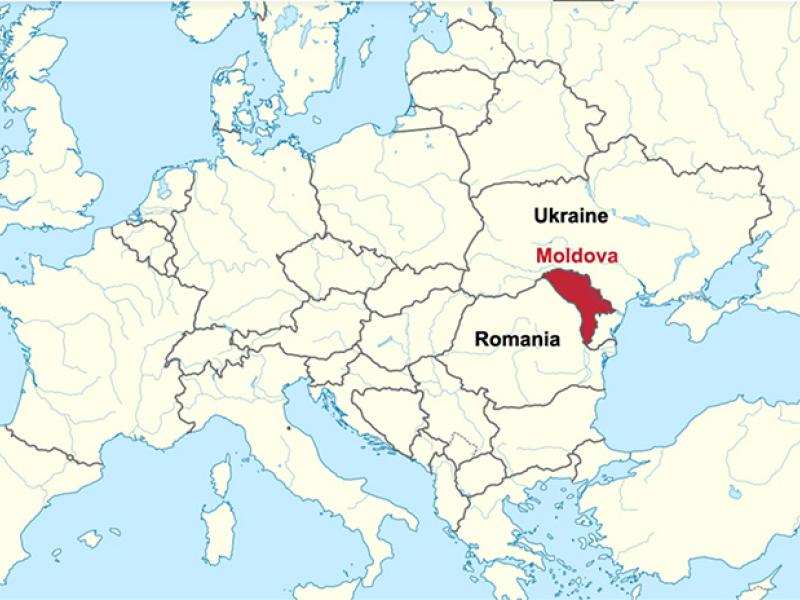Deploying CSDP missions to counter hybrid threats – EUPM Moldova: first of its kind
Managing cyber security in peace operations | Monika BenklerSince the start of the war in Ukraine 2022, the Republic of Moldova has seen increasing attempts by Russia to destabilise the country through hybrid actions. Chişinău faces various security challenges, including violations of airspace, threatening rhetoric from the Kremlin, a record number of cyberattacks and a flood of disinformation. In mid-March, a secret Russian strategy paper on how to bring the whole of Moldova into the Russian sphere of influence became public. At the request of the Moldovan government, the EU mandated the EU Partnership Mission in the Republic of Moldova (EUPM Moldova) on 24 April 2023, to enhance the resilience of the security sector in the areas of crisis management and hybrid threats. This includes cyberspace and what the EU terms Foreign Information Manipulation and Interference (FIMI) as one form of hybrid threats.
The Republic of Moldova on the road to Europe
Since its independence in 1991, the former Soviet Republic of Moldova has been caught in a tense tug-of-war between Western and Russia-oriented forces. In November 2020, the pro-European Maia Sandu was elected president, and the PAS party (Party of Action and Solidarity) she founded won an absolute majority in the parliamentary elections in July 2021. Since then, the government has clearly positioned itself as pro-European and reform-oriented. After the resignation of the recently unpopular Prime Minister Natalia Gavrilița, Dorin Recean took office on 16 February 2023. Building on the EU-Moldova Association Agreement (2014), Moldova has been a candidate for EU membership since 23 June 2022. On 15 May 2023, the country announced its intention to withdraw from the Commonwealth of Independent States (CIS). Russian influence remains high in many areas, including in the diverse but highly polarised media landscape.
Sandwiched between Romania and Ukraine, Moldova emerged as an independent republic following the collapse of the Soviet Union in 1991.
Source: BMZ
Hybrid threats in the Republic of Moldova
Energy, economic pressure, political influence
The ruling party's approval ratings had recently fallen sharply in representative polls (Nov. 2022), and popular discontent is growing in the face of inflation driven by skyrocketing energy prices. Russian supplier Gazprom cut gas supplies to the gas-dependent country by 30 percent in October 2022, allegedly because Moldova's debts were too high. In addition, no more electricity is flowing from Ukraine. Although Chişinău has separated itself from Russian gas supplies through infrastructure measures and European support, it paid a high price. Moreover, a weak point remains: electricity needs are largely met from a Russian gas-fired power plant in Transnistria, which has been a breakaway region since 1992.
In February and March this year, demonstrations against high prices and the government, which were initiated and co-directed by Moscow and organised by the pro-Kremlin opposition party Shor, again took place in the capital. In June, Moldova's Constitutional Court declared the party led by Ilan Shor, a businessman who fled to Israel in 2019, unconstitutional. According to the European Union, the protests, like the use of energy supplies as a political weapon, are part of the spectrum of hybrid actions that Russia is using to de-stabilise Moldova. In February 2023, the president accused Moscow of planning a coup.
Cyber attacks and FIMI
A further, central hybrid instrument are attacks in cyberspace. In 2022, Moldova recorded a significant increase (up by 35 per cent) in cyber-attacks. Cyber-attacks mainly target state infrastructures and attempt to obtain related sensitive information. Hacking into social media accounts and instant messaging systems used by key people in the government presents a particular problem. Elections are another popular target. The fourth (2020) ITU Global Cybersecurity Index (the fifth edition is under development) ranks Moldova 33rd in Europe (out of 46) and 63rd globally (out of 182). The Index maps 82 questions on Member State cybersecurity commitments across five pillars: legal measures; technical measures; organisational measures; capacity development measures; and cooperation measures.
Even before the annexation of Crimea and Moldova’s Association Agreement with the EU in 2014, Moldova was the target of disinformation campaigns by internal and external actors. The Ukraine war and Chişinău's EU accession aspirations have exacerbated the situation. Moldova is on the front line of an information war, says an open letter from eight Eastern European countries to major social media operators. Repeated attempts are being made to discredit the republic's leadership and create tensions in society.
One area of concern is Transnistria, where about 1,500 Russian soldiers are still stationed. At the end of February 2023, Russia again spread information about the preparation of an armed provocation by the Ukrainian army against Transnistria. On 20 February, President Vladimir Putin cancelled a decree from 2012, which had stipulated that a solution to the Transnistrian conflict could only take place "in compliance with the sovereignty, territorial integrity and neutrality of Moldova". The 5+2 format established to resolve the conflict (OSCE, Chişinău, Tiraspol, Ukraine and Russia plus EU and USA as observers), in which the OSCE Mission to Moldova, active since 1993, acts as mediator, has been blocked since 2022. However, the two parties to the conflict have maintained their 1+1 format with the support of the OSCE field presence.
Another trouble spot is the southern territorial unit of Gagauzia, autonomous since 1994, which has been the target of pro-Russian narratives for years. Here, too, demonstrations took place in 2022 against the high price of energy and in favor of resuming relations with Russia. In May 2023, a pro-Russian candidate from the above-mentioned Shor party won the second round of the elections for the governor (Bashkan) of Gagauzia.
The Russian Federation uses a wide range of tools to promote its "objective truth" and to influence the population of Moldova: TV, radio, print media, internet, social networks, etc.. This is facilitated, among other things, by the polarised and politically influenced media landscape in Moldova. Many media companies are financed by oligarchs and linked to political parties, such as the Russian-backed Party of Socialists of the Republic of Moldova (PSRM) of former President Igor Dodon, and promote the corresponding economic/political interests. The latest Media Literacy Index 2023, which measures the potential vulnerability to disinformation across Europe employing several indicators - the quality of education, media freedom, trust in society, and the use of new tools of participation - ranks Moldova 32nd of 41 countries in total.
Since the beginning of the war in Ukraine 2022, the Moldovan government has taken various measures to combat disinformation, including suspending the licences of six television stations that broadcast Russian television. At the end of May 2023, the President announced the establishment of a National Centre for Information Defence and Combating Propaganda (PATRIOT).
The Mandate of EUPM Moldova
In order to enhance the resilience of Moldova's security sector, the Council of the EU mandated the new civilian partnership mission EUPM Moldova (2023/855/CFSP). It is to
- on crisis management: strengthen Moldovan crisis management structures focused on the security sector. The first step is to identify needs for organisation, training and equipment and, as a further step, to implement the measures proposed;
- on hybrid threats (including cyber security and combating FIMI): Provide advice at strategic level on the development of strategies and policies; identify capacity-building needs for early warning, detection, identification, attribution and response to threats; and contribute to the implementation of the proposed measures.
The mission has a project cell to provide targeted operational support in line with the integrated approach and, as far as possible, in close coordination with other actors. The two-year mission started on 22 May and will initially comprise 40 personnel from Member State authorities and the private sector. Since 15 May, the Romanian diplomat Cosmin Dinescu has been on site as Head of Mission.
The EU Partnership Mission will in any case generate valuable insights into possible concrete steps to counter a growing (world-wide) threat.
Outlook
After the Civilian CSDP Compact 2018 opened for this possibility, EUPM Moldova is the first CSDP mission with a mandate in the area of hybrid threats. With its focus on advice, capacity building and training, it follows the guidance of the so-called mini-concept on hybrid threats, which was drafted in 2020. The comparatively small deployment has great symbolic significance and provides visibility for the EU. It is above all another political signal by the EU of its support to Moldova in the current difficult situation. The mission also continues the Union's efforts to strengthen the security sector in the Republic of Moldova and to accelerate its efforts in the fight against cyber attacks and FIMI in its neighbourhood. To militarily secure Moldova's national cyber space, the EU is also preparing to deploy an EU Cyber Rapid Response Team (EU-CRRT) under PESCO (Permanent Structured Cooperation).
Both the Strategic Compass (March 2022) and the new Civilian CSDP Compact (May 2023) placed further emphasis on the issue of hybrid threats. Initiatives are, for instance underway to develop a EU Hybrid Toolbox and a FIMI Toolbox. In 2024, the EU aims to provide, “the necessary capabilities to strengthen resilience against and response to hybrid and cyber threats, as well as FIMI, of host countries, wherever relevant, and of civilian CSDP missions, supported by the EEAS” (Civilian CSDP Compact, p.22, No.9). The EU Partnership Mission is a tangible attempt to put these ambitions into practice. It is too soon to tell whether it can help to effectively manage the challenges that Moldova is facing. But the EU effort will in any case generate valuable insights into possible concrete steps to counter a growing (world-wide) threat.
IMAGES
- Author | Monika Benkler priv.
- Flag of the Republic of Moldova | © Unsplash, Sasha Pleshco
- Map | © BMZ

